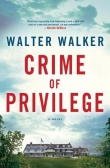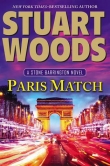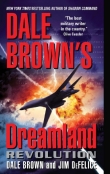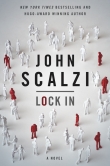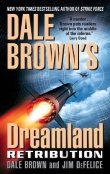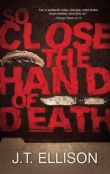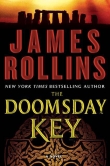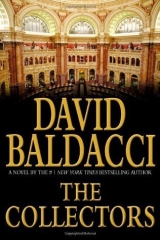
Текст книги "The Collectors"
Автор книги: David Baldacci
сообщить о нарушении
Текущая страница: 6 (всего у книги 27 страниц)
Chapter 14
As the Camel Club left DeHaven’s home, two pairs of binoculars were trained on them. One was from an upper window of a house across from DeHaven’s and another held by a man in the back of a van parked down the street that had stenciled on its side “D.C. Public Works.”
When the motorcycle and Nova drove off, the van followed.
After the vehicles had disappeared, the pair of binoculars in the upper window of the house on Good Fellow Street continued to scan the area.
As Caleb predicted, it took twenty minutes to get to Vincent Pearl’s rare book shop. There was no name on the storefront, only a sign that read “Hours 8 PM to Midnight, Monday to Saturday.” Caleb marched up to the door and rang the bell.
Reuben looked around at the stout door and barred window. “I take it he’s not into advertising.”
“Anyone serious about book collecting knows exactly where to find Vincent Pearl,” Caleb replied matter–of–factly.
“You know him well?” Stone asked.
“Oh, no. I hardly operate at the level of a Vincent Pearl. In fact, in the last ten years I’ve only met him personally twice, both times here at his shop. I’ve heard him lecture before, though. He’s quite unforgettable.”
The lighted dome of the Capitol was visible to the west. The neighborhood they were in was lined with ancient moss–covered brick and stone row houses and other dwellings that had once been a focal point of the burgeoning capital city.
“You sure he’s here?” Milton asked just as a deep voice said in a demanding tone, “Who is it?”
Milton jumped, but Caleb spoke into a small loudspeaker barely visible under a strand of twisted ivy next to the door. “Mr. Pearl, it’s Caleb Shaw. From the Library of Congress.”
“Who?”
Caleb looked a little embarrassed and started speaking quickly. “Caleb Shaw. I work in the Rare Books reading room. We last met a few years ago when a collector of Lincoln memorabilia came to the library and I brought him around to you.”
“You don’t have an appointment for tonight.” The tone was one of mild annoyance. Apparently, Pearl wasn’t grateful for the referral Caleb had given him.
“No, but I come on some urgency. If you could just spare a few minutes.”
A few seconds later the door clicked open. As the others entered, Stone noted a tiny reflection from above. The small surveillance camera was staring right at them, ingeniously disguised as a birdhouse. The reflection was from the streetlight hitting the lens. Most people would have missed such a device, but Oliver Stone was not most people, certainly when it came to things that spied on you.
As they passed into the store, Stone also noted two other things. The door, although it looked old and wooden, was actually made of reinforced steel, set in a steel frame, and the lock, to Stone’s experienced eye, looked tamperproof. And the barred window was three–inch–thick polycarbonate glass.
The interior of the shop surprised Stone. He had expected to see a cluttered layout, with dusty books on bowed shelves and every crevice bursting with old parchments and tomes for sale. Instead, the place was clean, streamlined and well organized. The building itself was two stories in height. Tall ornate bookshelves lined every wall, and the books housed in them were behind locked sliding glass doors. A ladder on wheels ran on a long track tube attached to the tops of the nine–foot–high shelves. Three oval cherrywood reading tables with matching chairs sat in the middle of the long, narrow space. Overhead was a trio of bronze chandeliers that gave off surprisingly weak light. They must be on dimmers, Stone thought. A six–foot–wide spiral staircase led to the level above, which was partially open to the floor they were on. Up there Stone could see still more shelves, with a Chippendale–style banister running around the opening to the first floor.
A long wooden counter was at the end of the main room with still more shelves behind it. What Stone wasn’t seeing surprised him. No computers, not even a cash register was visible from where he stood.
Reuben said, “Feels like a place you’d want to smoke a cigar in and have a tumbler or two of whiskey.”
“Oh, no, Reuben,” Caleb said in a shocked tone. “Smoke is deadly to old books. And one spilled drop can ruin a timeless treasure.”
Reuben was about to say something when a heavily carved door behind the counter opened and an old man walked out. Everyone except Caleb did a double take because the gentleman’s silvery beard was long and flowed down across his chest, and his long white hair cascaded down past his shoulders. His costume was even more eye–catching. Over his tall, potbellied frame he wore a full–length lavender robe with gold stripes across the sleeve. His rimless oval glasses were perched on his long wrinkled forehead, where wisps of grizzled hair lay in an untidy fashion. His eyes were, yes, they were black, Stone decided, unless the poor light was playing a trick on him.
“Is he a monk?” Reuben whispered to Caleb.
“Shh!” Caleb hissed as the man came forward.
“Well?” Pearl said, looking at Caleb expectantly. “Are you Shaw?”
“Yes.”
“What is your matter of urgency?” Pearl suddenly glared at the others. “And who are these people?”
Caleb quickly introduced them, using only their first names.
Pearl’s gaze lingered the longest on Stone. “I have seen you in Lafayette Park, have I not? In a tent, sir?” he said with exaggerated formality.
“You have,” Stone replied.
Pearl continued, “Your sign says, if I recall correctly, ‘I want the truth.’ Have you found it?”
“I can’t say that I have.”
Pearl said, “Well, if I were inclined to seek the truth, I don’t believe I would start my search across from the White House.” Pearl turned back to Caleb. “Now, your business, sir?” he said briskly.
Caleb hastily explained about his being appointed DeHaven’s literary executor and his request about the appraisal.
“Yes, it was certainly a tragedy about DeHaven,” Pearl said solemnly. “And you’ve been named his literary executor, have you?” he added in a surprised tone.
“I helped Jonathan with his collection, and we worked together at the library,” he answered defensively.
“I see,” Pearl replied tersely. “But you still require an expert’s eye, obviously.”
Caleb turned slightly pink. “Uh, well, yes. We have an inventory of the collection on Milton’s laptop.”
“I would much prefer to deal in paper,” Pearl replied firmly.
“If you have a printer here, I can take care of that,” Milton said.
Pearl shook his head. “I have a printing press, but it’s from the sixteenth century, and I doubt it’s compatible with your contraption.”
“No, it wouldn’t be,” mumbled a shocked Milton. A devoted lover of all things technological, he was obviously stunned at Pearl’s lack thereof.
“Well, we can print one out and bring it to you tomorrow,” Caleb suggested. He hesitated and then said, “Mr. Pearl, I might as well come right out and say it. Jonathan has a first–edition Bay Psalm Book in his collection. Did you know about it?”
Pearl lowered his glasses onto his eyes. “Excuse me, what did you say?”
“Jonathan has a 1640 Bay Psalm Book.”
“That is not possible.”
“I held it.”
“No, you did not.”
“I did!” Caleb insisted.
Pearl waved a hand dismissively. “It’s a later edition, then. Hardly earth–shattering.”
“It has no music. That started with the ninth edition in 1698.”
Pearl eyed Caleb severely. “Doubtless you won’t be surprised to learn that I am aware of that. But, as you point out, there are seven other editions that have no music.”
“It was the 1640 edition. The year was printed on the title page.”
“Then, my dear sir, it’s either a facsimile or a forgery. People are very clever. One ambitious fellow re–created the Oath of a Freeman, which antedates the Psalm Book by one year.”
Stone interjected, “But I thought the 1640 Bay Psalm Book was the first printed book in America.”
“It is,” Pearl said impatiently. “The Oath wasn’t a book; it was a one–page document called a broadsheet. As its name suggests, it was an oath, a pledge of allegiance if you will, that each Puritan male took in order to vote and enjoy other privileges in the Massachusetts Bay Colony.”
“And it was forged?” Stone said.
“Ironically, the forger used a facsimile of the Psalm Book. He did so because it was struck on the same press as the Oath and by the same printer and thus utilized the same printing type.” Pearl tapped Caleb on the chest. “The criminal was very ingenious, with the result that he very nearly duped your Library of Congress into buying it. Only when an expert in printing presses noted certain irregularities was the deceit uncovered.”
Caleb said, “I’ve worked in the Rare Books Division for over a decade. I’ve examined the Psalm Book that we have. In my opinion Jonathan’s is real.”
Pearl eyed Caleb suspiciously. “What was your name again?”
Caleb’s pink face now turned red. “Caleb Shaw!”
“Well, Shaw, did you run the standard authentication tests on the book?”
“No, but I looked at it, held it, smelled it.”
“My God, man, you can’t possibly be certain from such a rudimentary examination. DeHaven simply did not have that sort of a collection. A Tamerlane, a few incunabula, even the Dante, which I sold him, by the way, constituted the heart and soul of his rare books. No first–edition Psalm Book was ever a part thereof.”
“So where did Jonathan get the book?” Caleb asked.
Pearl shook his head. “How could I possibly know that?” He looked at the others. “As your friend may have told you, there are only eleven existing Bay Psalm Books in the world out of the original print run. Just think about that, gentlemen. By comparison there are 228 Shakespeare First Folios, but only eleven Psalm Books on the entire earth. And of that number only five are in complete condition.” He held up the fingers of his right hand. “Only five,” he added with great solemnity.
As Stone stared at the luminous black eyes that seemed to pour out of the deep sockets like oil escaping the earth, it was clear to him that a spiritual diagnosis of Vincent Pearl would clearly reveal that he too suffered from bibliomania.
The bookseller turned back to Caleb. “And since all eleven are accounted for, I can hardly see how one made its way to the collection of Jonathan DeHaven.”
“So why keep a forgery locked up in a vault?” Caleb countered.
“Perhaps he thought it was real.”
“The head of the Rare Books Division fooled by a forged book?” Caleb said contemptuously. “I seriously doubt that.”
Pearl was unperturbed. “As I said before, the library was nearly deceived into buying a fake Oath. People will believe what they want to believe, and book collectors are not immune to that impulse. In my experience self–delusion knows no boundaries.”
“Maybe it would be better if you came by Jonathan’s house so you can see for yourself that the Psalm Book is an original,” Caleb said stubbornly.
Pearl stroked his unruly beard with the long, delicate fingers of his right hand while he kept his withering gaze on Caleb.
“And of course, I would welcome your expert opinion on the rest of the collection,” Caleb added in a calmer tone.
“I believe I might have some time tomorrow evening,” Pearl said in a clearly disinterested manner.
“That would be fine,” Caleb said, handing him a card. “Here’s my number at the library, just call to confirm. Do you have Jonathan’s address?”
“Yes, in my files.”
“I think it best not to mention the existence of the Psalm Book to anyone, Mr. Pearl, at least for now.”
“I rarely mention anything to anyone,” Pearl said. “Particularly things that are not true.”
Caleb turned absolutely scarlet as Pearl ushered them quickly out.
“Okay,” Reuben said outside as he pulled on his motorcycle helmet. “I think I just met Professor Dumbledore.”
“Who?” Caleb exclaimed, obviously still furious from Pearl’s parting shot.
“Dumbledore. From Harry Potter, you know.”
“No, I don’t know,” Caleb snapped.
“What a bloody muggle,” Reuben muttered as he slipped on his goggles.
Caleb said, “Well, Pearl obviously doesn’t believe the Psalm Book is authentic.” He paused, and then he said in a less confident tone, “And maybe he’s right. I mean, I only looked at the thing for a few moments.”
Reuben piped in, “Well, the way you told Pearl off in there you better be right.”
Caleb flushed. “I can’t believe I did that. I mean, he’s famous in the book field. I’m just a government librarian.”
“A first–rate librarian at one of the world’s greatest institutions,” Stone added.
“He may be terrific in his field, but he really needs to get a computer. And a printer that’s not from the sixteenth century,” Milton added.
The Nova pulled off. As Reuben kick–started the Indian, Stone, on the pretense of adjusting his tall body better in the sidecar, glanced behind him.
As they drove off, the van continued to follow.
When the Chevy Nova and the motorcycle split up, the van tailed the bike.
Chapter 15
Despite the lateness of the hour, Stone instructed Reuben to drop him near the White House instead of his caretaker’s cottage at Mt. Zion Cemetery. He’d noticed the van following them and wanted to do something about it.
He quietly explained the situation to Reuben as he was getting out of the sidecar, describing the van to his friend.
Stone said, “Keep an eye out. If the van follows you, I’ll call you on your cell phone.”
“Shouldn’t you call Alex Ford for some backup? After all, we did make him an honorary member of the Camel Club.”
“Alex is no longer assigned to the White House. And I don’t want to call him out on what might be nothing. But there are other Secret Service personnel here that can help me.”
When Reuben pulled away, Stone slowly passed his tent, with the sign “I want the truth” next to it. No other protesters were here tonight, including his friend Adelphia. Then he made his way quickly toward a statue in the park of a Polish general who’d aided the Americans in the Revolutionary War. His reward for this good service had been a large memorial on which hundreds of birds crapped daily. Climbing up on the statue’s pedestal, he saw that the van remained parked on 15th Street, outside the 1600 block of Pennsylvania Avenue closed to traffic.
Stone climbed back down and approached one of the uniformed guards who protected the White House perimeter.
“What’s up tonight, Oliver?” the man said. He’d been guarding the White House for almost ten years and was well acquainted with Stone. For his part Stone was always polite and adhered strictly to the rules of the protest permit that he carried in his pocket.
“Hello, Joe, I wanted to give you the heads–up on something. It might not be anything, but I know the Service doesn’t like to take chances.” He quickly explained about the van, but without pointing toward it. “I thought you should know in case you wanted to check it out.”
“Thanks, Oliver. I owe you.”
As Stone had learned in all his years here, there was no detail too small for the Secret Service when it came to guarding the president. Thus, a couple minutes later he watched from nearby as Joe, joined by another armed guard, approached the D.C. Public Works van. Stone wished he had thought to bring his binoculars tonight, but they sat on his desk back at the cottage. He tensed when the driver’s window of the van came down.
The next thing that happened was stunning. The two uniformed guards whirled around and walked quickly away from the van as the driver’s window slid back up. The men did not come near Oliver Stone; they headed in the exact opposite direction as fast as they could go without running while the van remained where it was.
“Damn,” Stone muttered under his breath.
Now he knew. The people in the van were members of a government agency with enough clout to send the Secret Service scurrying away like frightened children. Now was the time to run. But how? Should he call Reuben? Yet he didn’t really want to involve his friend in this. A thought struck him.
Was his past finally catching up to him?
He quickly made up his mind and strode off across the park, reached H Street and turned left. The Farragut West Metro stop was only a couple blocks away. He checked his watch. Damn! The subway was closed. He changed direction, constantly looking over his shoulder for signs of the van. He decided to keep hoofing it down the street; he might catch a late–running bus.
When he reached the next intersection, the public works van screeched to a stop directly in front of him and the slide door started opening.
Then Stone heard the voice shouting at him.
“Oliver!”
He looked to his right. Reuben had driven his motorcycle up on the sidewalk and was speeding directly at him. He slowed just enough to allow Stone to dive into the sidecar. Reuben flew over the curb, back onto the street and gunned the motorcycle with Stone’s long legs sticking straight up out of the sidecar.
Reuben, whose knowledge of the streets of D.C. nearly equaled Stone’s, made a series of rights and lefts before he slowed the bike, eased into a dark alley and came to a stop behind a Dumpster. By this time Stone had righted himself in the sidecar. He looked up at his friend. “Your timing couldn’t have been better, Reuben. Thanks.”
“When you didn’t call, I circled back around. The van started to move and I followed it.”
“I’m surprised they didn’t spot you. This motorcycle does tend to stick out.”
“Who the hell are those guys?”
Stone told his friend about the run–in with the Secret Service.
Reuben said, “There aren’t many agencies that can make the Service turn tail on its own turf.”
“I can think of maybe two: CIA and NSA. Neither one gives me much comfort.”
“What do you think they wanted?”
“I first spotted the van outside the rare book shop. It might have been following us before then, though.”
“At DeHaven’s?” Reuben snapped his fingers. “You think this has something to do with that Cornelius Behan prick? He’s probably joined at the hip with the spy guys.”
“It might, considering the timing.” Maybe this wasn’t tied to his past, after all.
Reuben looked nervous. “Oliver, if they were following us, do you think they might have had a tail on Caleb and Milton?”
Stone was already on his phone. He reached Caleb and told him some of what had happened and put his phone away. “He just dropped Milton off at home. They didn’t see anyone, but they probably wouldn’t have.”
“But what did we do to get spooks after us? We told Behan what we were doing there. What interest could he have in DeHaven?”
“He might have an interest if he knew how DeHaven died. Or perhaps more accurately, how he was murdered.”
“You’re saying Behan might have had his neighbor killed? Why?”
“You just said it, his neighbor. It’s possible that DeHaven saw something he shouldn’t have.”
Reuben snorted. “On Good Fellow Street, with the rich and obnoxious?”
“It’s all speculation, but the fact remains that if you hadn’t shown up, I’m not sure what would’ve happened to me.”
“So what do we do now?”
“Since it seems no one was concerned about us until we went to Jonathan DeHaven’s house, we start there. We find out whether the man was murdered or not.”
“I was afraid that’s what you were going to say.”
Stone settled himself in the sidecar, this time with his legs where they ought to be. Reuben started the motorcycle and they set off.
Just like old times, Stone thought. And that clearly wasn’t a good thing.
• • •
The men in the van reported in to a very upset Roger Seagraves.
“We could’ve taken the old guy even though his buddy showed up, but we figured it might be too dicey,” one man said over the phone.
Seagraves stared at his secure phone for a moment, thinking what his next move should be. “They were at DeHaven’s for how long?”
“Over five hours.”
“And then to a rare book shop, and then you followed them to the White House.”
“Yep. One of them has a tent in Lafayette Park. And according to the Secret Service, his name is Oliver Stone. What a joke!”
“He spotted your tail, so I don’t know how much of a joke he is,” Seagraves snapped. “And I don’t like you flashing your creds around, especially to the Service.”
“We just got in a jam and had to do it. But we are with the Agency,” the other man countered.
“But not on official duty tonight,” Seagraves shot back.
“So what do you want us to do?”
“Nothing. I want to check out Mr. Stone more thoroughly. I’ll be in touch.” Seagraves hung up.
A man calling himself Oliver Stone has a tent across from the White House, can spot expert surveillance and visited the house of a man I had killed. Seagraves could feel another thunderstorm coming on.
